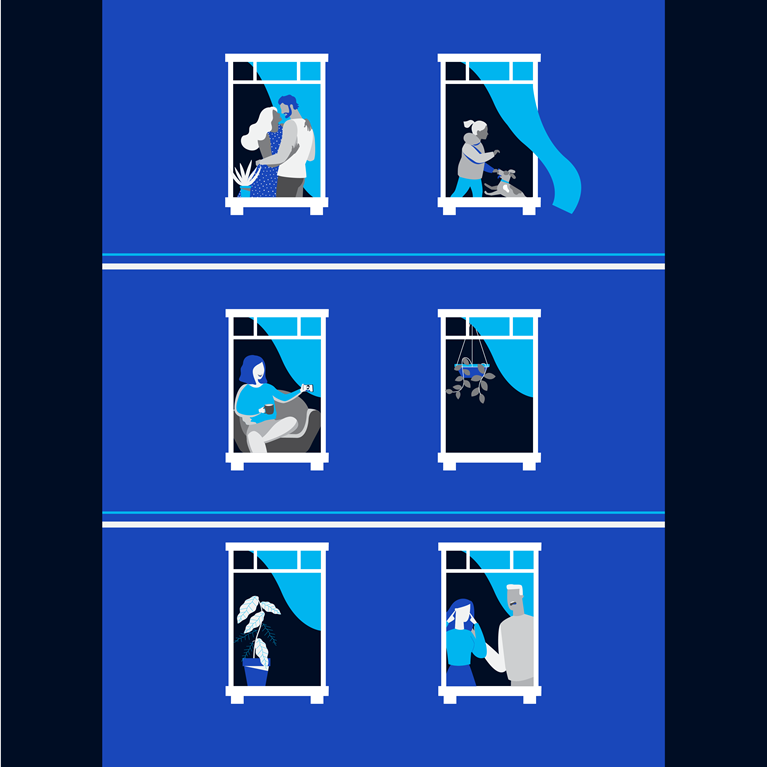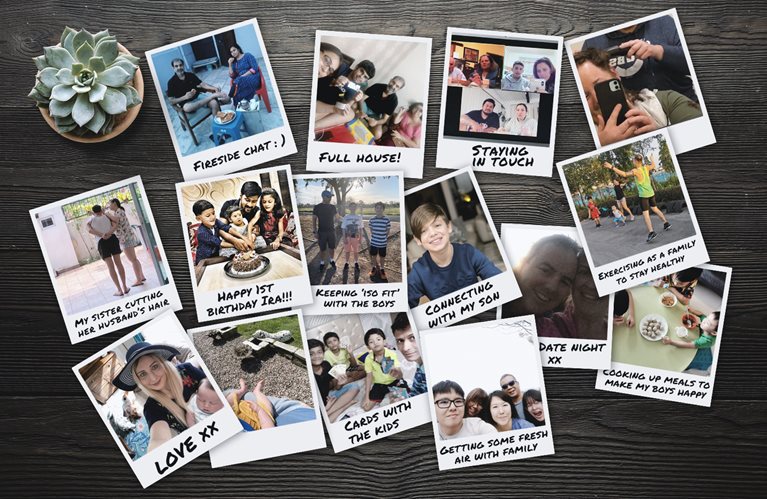The New Possible is a series of human stories and perspectives on how COVID-19 is challenging and changing our lives and livelihoods. In this installment, we explore how the crisis is shaping relationships.
Earlier, we introduced you to Giuseppe, a football-loving 49-year-old who lives with his partner and two children in Rome.
Giuseppe left his job in December to launch his own business, an auto-parts store. He’s had a rough start. Since the coronavirus outbreak shut down businesses across Italy, Giuseppe hasn’t earned any income. Now he’s facing tough choices, including whether to abandon the business he’s dreamed of starting.
He’s also worried about his sons, six and ten. They’ve been out of school for months. The swimming and capoeira lessons that used to keep them busy after school have been replaced by screen time, idleness, and boredom at home.
When we spoke with Giuseppe, he mentioned one good thing that had come from his difficult circumstances. He said that spending so many hours with his boys, cooking and playing football, has helped him feel closer to them than ever. Despite challenges and stress, he’s appreciated the time to deepen those relationships.
“I learned in this crisis to better understand small facets of their personality—their strengths and weaknesses,” he told us. “They are the most beautiful thing I have.”
The coronavirus crisis has had a tragic impact on individuals and families worldwide. People have lost loved ones to the virus. Healthcare workers and first responders have spent traumatic hours tending to the sick and dying. Millions are out of work. The collective mental and emotional toll is perhaps beyond measure or even description.
These effects show up in our relationships. Some, like Giuseppe, have deepened or renewed their bonds with family and friends. Others have had social connections limited or cut off. All of this is changing families, testing friendships, and transforming dating.
The people we spoke with said they know their relationships have changed. And they don’t expect them to go back to the way they were.
The family pressure cooker
The lockdown has turned some of our participants’ homes into pressure cookers. Here’s what they said it feels like.
Space is tight. Several people we spoke with live in small houses or apartments. Under normal circumstances, when they feel hemmed in, they can escape to common spaces in their buildings or to public places. Things have been tough without these release valves. Mary, for example, lives in New York City with her 13-year-old son. “We’re on top of each other in a cramped, small apartment,” she said. “I’m driving him a little crazy. He’s driving me a little crazy.”

Tension is high. Stressed-out people sharing close quarters for long periods is not a recipe for peace and harmony. Times were hard enough for Qiang, 45, after he lost his job as a shoe salesperson in Shanghai when the pandemic began. Now stuck at home, he often finds himself at odds with his wife. “During lockdown, my wife and I started to have arguments, which was very rare previously,” he said. “There was a ton of irritation pent up.”
Adaptation is essential. Some people told us they’ve developed new ways to find solitude. Faith, who lives in Elsternwick, Australia, said that she and her husband have learned that it’s important to let each other be. “We just ignore each other a lot, to be honest,” she said. “He’ll be doing his thing, and I’ll be doing my ‘pretend work’ and go and sit in the other room if I don’t want to see him. Or I’ll just put my earphones on and point to them and say ‘working,’ even if I’m not.”
A new era for relationships
This period is also creating new chances for people to slow down, reconnect, and strengthen relationships. People told us they appreciate certain new aspects of their lives during lockdown.
An increase in quality time. Lucas, a chef in Seaford, Australia, has been happy to spend more time at home, especially on the weekend. “This moment is actually kind of special for us,” he said. “Being a chef, our busiest times are Friday, Saturday, Sunday, so I’m normally at work on those days. Getting to sit down and watch a movie with the family on a Saturday is pretty cool.”
The surprise of special gestures. When we spoke with Anuradha, she was celebrating her wedding anniversary. Her husband had baked her a cake from scratch—for first time ever. “Before COVID, we only used to order the ready-made cake, but this time he made it himself,” she said. “He found a recipe on YouTube and tried his best. It really felt nice that he took this initiative, even during these tough times. These small things really matter right now.”
A deeper appreciation for family ties. Cecilia, 55, lives in Chicago. But she chose to shelter in place with her cousin in Arizona, where she’s nearer to several relatives. She told us she may stay there. “I am now valuing the company of my family in ways I never imagined,” she said. “I love my [Arizona] family, but I’d never previously felt ready to move here.”
The return of romance. We heard touching stories of couples finding a deeper sense of love and appreciation for each other. Some felt this experience had brought new dimensions to their relationships. Dylan, who lives in Manchester, England, said that while life during the pandemic has been shocking, it’s also done good things for his family and for his marriage in particular. “My wife and I just decided to lie on the children’s trampoline and look up at the sky,” he told us one day. “This situation has brought us closer together and improved our relationship.”

Social resurgence after social distancing
We think one change is unlikely to last in the next normal: the uptake of personal video calls. Some have maintained or even created friendships built on video calls. But our conversations suggest that digital technology can’t bridge the physical divides between people and those they love. Benedetta, a secretary living in Rome, told us, “I miss seeing my brothers and grandchildren in flesh and blood and not through a monitor.”
Many factors limit the appeal of video calls, including the lack of direct eye contact, the absence of natural pauses in exchanges, and the challenge of maintaining a normal conversational rhythm, particularly in groups. But the most powerful may be that people are wired to spend time together in person.
“Visiting, gathering, shaking hands, and hugging are core human behaviors that connect us,” said Yau, a woman living in Guangzhou. “We can’t give up on them. We have to continue doing them once everything goes back to normal.”
As we emerge from lockdown and people return to their workplaces, how will people and families adjust to “normal” life? And what might that mean for businesses and employers?
COVID-19 could catalyze a global shift in how people prioritize their relationships. Many people have been forced to let go of their daily routines. The space created by this pause, while not necessarily welcome at the beginning, is nevertheless being filled by emotional connections that didn’t always fit in before—and will likely be tough to give up. Organizations need to think about this. People tell us they’re invested in maintaining the relationship gains they’ve made. How can leaders create environments in which these newfound and cherished connections can thrive?
Thanks for reading. For more stories about how this crisis is shaping the way we live, work, and feel, please check out The New Possible collection page. Have your own story to share? Email us at new_possible@mckinsey.com.